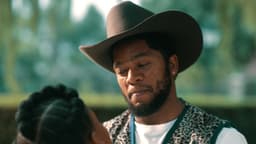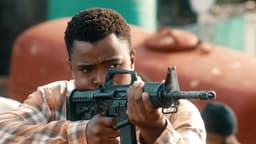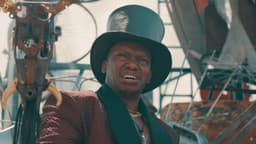
Amy Jephta on writing Showmax Original Catch Me A Killer
Charlotte Hope (Game of Thrones, The Spanish Princess) stars in Catch Me a Killer as Micki Pistorius, South Africa’s first-ever serial-killer profiler.
Adapted from Pistorius’ memoir, each episode looks at another of her cases, from the Station Strangler to the Cleveland Killer to Stewart “Boetie Boer” Wilken.
Watch the trailer for Catch Me A Killer
Leading critic Leon van Nierop calls the Showmax Original, “One of South Africa’s best true-life crime series, with a fresh approach.”
We chatted to SAFTA winner Amy Jephta (Oscar entry Barakat, Showmax Original Skemerdans) about being the lead writer on the series, which premieres on Showmax on 12 February 2024.
How did you get involved?
Simon Howley and the producers had the rights to Micki’s book, and were looking for a South African writer to write the first episode and see if it could be a show. Simon, Micki and I sat together and began to break the book down into episodes. This is the third adaptation of a South African book I’ve done, after Deon Meyer’s Trackers and Devil’s Peak.
What’s it been like working with Micki?
Micki is a fascinating and incredible woman. She's been through a lot. She details a lot of that vulnerability and her journey with her career and her life in her book, and she's very uninhibited. It was incredible getting to know, in small doses, the real person behind those words. You have an idea of what a forensic profiler should be, and you think of them as quite solemn and stern and traumatised and affected, but Micki is just joyous. She has a bubbliness and effervescence. She's really quirky. It was a pleasure to work with her words.
How did working on Catch Me A Killer differ from working on Deon Meyer’s books?
Deon Meyer writes with a cinematic mind; his books play like a movie or a show while you read them. And his characters are all creations of his mind. With Micki’s book, you’re working with her life - it’s not packaged to jump straight to screen. It's very precious, because you're trying to tell someone's real life story.
What was it like telling a story about such a strong woman?

It’s always incredibly exciting to have a female-driven story, especially in a thriller. She’s in a man’s world; she’s the only female forensic psychologist at that time in the SAPS. The way she does her job is unlike how a man would do it. It was really exciting for me to figure out how a woman would think in this situation. What are the adversities that she faced? It was 1994. It was a time of discrimination and she was underestimated. That’s my favourite kind of character to write: the character that nobody thinks is going to amount to much and then they soar. The underdog story is always the one I gravitate towards. And that's really her story. The underdog.
Tell us more about the writing team, and your process.
We had an incredible team of writers: it was myself, Jess Ruston [Harlots], Oliver Frampton [Sister Boniface Mysteries] and Sarah Hooper [Shameless].

We came together and started to think: how do you break this life story down? What was great is that each chapter in Micki's book is hard baked with a lot of intrigue and mystery. You can't help but have that when you’re hunting for a serial killer. That's literally the premise of each episode. It's to find out: Who is this person? What are they made of? Who are they psychologically? How can we pin them down? And that has its own inbuilt ticking clock.
It's not a whodunit. It’s a whydunnit. Why did these people commit these acts? You're inside the perspective of these killers and the victim's families as much as you’re inside Micki's perspective. What we're trying to figure out is: how is she going to crack this case? What's going to be the thing that blows it open? How is she going to put these pieces together? How is she going to build this puzzle? And that's the essential mystery at the heart of the story.
These are gruesome stories. How did you ensure it didn’t affect you personally?
It was an immersion into something extremely dark, to not only understand what Micki was thinking in these moments, but also to really try and understand the heart and mind of each of these killers. To do that you have to have a lot of empathy. As a writer, you can't walk into the story already judging the people you're trying to not only humanise, but the people you're trying to complexify. I always think that as a writer it's my job to not cast judgement on any of the characters I'm writing.
To understand and unpack them, I think we went into some pretty dark places. It’s not comparable to what Micki went through in those years that she was working as a profiler, but I think I almost touched the “edge of the edge” of what could have been going on in her mind.
The thing that affected me the most are the victims, especially the children.
How do you think the audience will respond to the way that Micki empathises with the serial killers?
I think the question of empathy is really interesting, and it’s something that divided us as writers. On the one hand, it’s so hard to empathise with a serial killer, because they’ve crossed so many moral lines. But what makes Micki’s job so incredibly special is that she has to understand a killer’s humanity to catch him and put him behind bars where he belongs.
You can’t understand the holistic makeup without understanding the childhood, without understanding the relationship with the parents, without understanding where they grew up. What were the socio-economic circumstances that shaped that mind? Why violence? Why these particular acts of violence? When you start delving into the makeup of a serial killer, you can't help but be touched by the humanity that is still somewhere within that person. Inside everyone is a child who came from somewhere. I think as a writer I have to be able to empathise with that, even if I don’t approve of it.
Do you have a favourite episode?
What’s great about this is that every episode transports you to a different world. I really love episodes 8 and 9, the Cane Field Killer: Oliver Frampton’s double-header of an episode. And I really love the first two episodes; those are my episodes. The reason is that they are set in the place that I come from, Mitchell's Plain.
The series opens in my home suburb on the Cape Flats. And I was there around that time. The story deals with the Station Strangler Killer, 1992-1994. I was in Grade 1. I remember what it felt like to be a kid at a time where there were these boys being abducted and the fear in our community. So I could draw a lot on my first-hand feeling.
My mother was a police officer at the same police station that Micki was stationed at in 1994. I was in and out of that police station. Many of the cops, who appear as characters in Micki’s book, knew me as a child.
It’s really special to me that I was able to lean into my own experience, even though this was a world away from what I was doing at the time. I was seven years old, but I remember the mythology of that serial killer being present in my childhood.
Did you ever see Micki at the police station?
I didn't. But my mother remembers Micki at the police station.
I remember the tin cans that they put Micki and her operation in: they were like caravans or trailers on the outskirts of the police station. And I remember those being ever-present between 1992 to 1994.
There was so much detail that I was able to scrounge from my mother having been there, from friends of hers, from police contacts who were there at the time, from Micki herself. From my own memory.
I know what it was like to be on a school field playing outside when someone would yell “Station Strangler!” and all the kids would just run into the school. I remember what it felt like when the people were protesting at the gates of the Mitchell’s Plain police station. A lot of those images in the show are actually drawn from my memory.
Do you think Micki’s story is relevant today?
What the story gives us is an understanding of the social context that shapes serial killers. The people who commit these heinous acts have so much in common and a lot of that has to do with their home life and the families in which they were raised. I don’t believe someone is born wicked; they are shaped by their environment. There’s a lesson to be learned about how we protect the minds and hearts of children, because they’re our most vulnerable.
The thing I keep returning to is that serial killers were children at some point. They were unloved. They were abandoned. They were abused. How can we protect each other and stop the vicious cycle of murder and violence in this country?
That these events happened in 1994 gives us some distance to reflect on what kind of society we’re shaping here in our country. I think it’s a mirror for South Africans to ask what it is about our country that makes these men so violent. What is it about South Africa that turns us into the murder capital of the world, or the place where, at one point in history, we had the highest number of active serial killers anywhere in the world? This, I think, is very relevant.
Are audiences ready for this story? What makes it so different?
This is an elevated form of South African storytelling that you probably haven’t seen before. The detail in the design, in the writing, the acting, the directing - I think it’s going to put us on a global stage. I think it can compete internationally with the best of Nordic crime dramas, and the best of American crime thrillers. And I think it’s about time our South African landscapes, our actors, and our directors are given that opportunity to be seen on the world stage.
We don’t want people to say, ‘This is good for a South African show’. I want people to watch this and go, ‘It’s an amazing show’. Period. There’s no qualifier. It’s just an amazing showcase for the talents of filmmakers in this country, and our collaborative efforts, as it’s a British and South African co-production. So yes, I’m really excited for audiences to see it.
Stream Catch Me A Killer now on Showmax, with new episodes on Tuesdays until 10 April 2024.
More like this

Jojo on The Real Housewives Ultimate Girls Trip: Africa reunion, social media backlash and more
Jojo opens up about the highly anticipated reunion for The Real Housewives Ultimate Girls Trip: Africa, coming to Showmax on 20 and 27 February.

South Africa’s stories and storytellers recognised as SAFTA nominees announced
Mzansi’s boldest stories take centre stage as the 2026 SAFTA nominees are unveiled, with a wave of nominations across DStv and Showmax.

The ‘Burbs S1
In this adaptation of the 1980s Tom Hanks dark comedy, a couple moves back to the husband's hometown, only to face a cul-de-sac shrouded in mystery.

“You don't create something so powerful purely through military tactics” - Shaka iLembe co-creator
Shaka iLembe co-creator Desireé Markgraaff reflects on the vision, research, and importance of telling our stories. Stream Seasons 1–2 on Showmax.

Where to see the cast of Shaka iLembe S1-2 on Showmax
From Nomzamo Mbatha as Queen Nandi to Lemogang Tsipa as King Shaka Zulu and Thembinkosi Mthembu as King Dingiswayo, see the cast of Shaka iLembe in some of their other acclaimed roles on Showmax. Binge now on Showmax.

MaBlerh to host the first-ever The Real Housewives Ultimate Girls Trip: Africa reunion
MaBlerh will host the first-ever reunion for The Real Housewives Ultimate Girls Trip: Africa, set to air in two parts in February 2026.

Shaka iLembe S1-2
Set in the 1700s, Shaka iLembe tells the story of the making of the iconic African king. All episodes are now available to binge.

Six Taylor Sheridan series while we wait for The Madison
Excited about The Madison coming in April? We’ve rounded up all the Taylor Sheridan series you can watch on Showmax while we wait.
Adulting S2: Family Matters
Adulting S2: Somebody's lying
More Showmax Originals you'll love

Jojo on The Real Housewives Ultimate Girls Trip: Africa reunion, social media backlash and more
Jojo opens up about the highly anticipated reunion for The Real Housewives Ultimate Girls Trip: Africa, coming to Showmax on 20 and 27 February.

MaBlerh to host the first-ever The Real Housewives Ultimate Girls Trip: Africa reunion
MaBlerh will host the first-ever reunion for The Real Housewives Ultimate Girls Trip: Africa, set to air in two parts in February 2026.

Nhlanhla Kunene confirmed for Law, Love and Betrayal Season 2
See Nhlanhla Kunene in Law, Love and Betrayal Season 2 as Mondli Gumede, from 8PM on 8 March on Mzansi Magic, and streaming from 9 March on Showmax.

Christall dishes on The Real Housewives Ultimate Girls Trip
Christall Kay on the drama of The Real Housewives Ultimate Girls Trip: Africa, and what it was like to reunite with Evodia. All episodes on Showmax.
Latest Stories

Schalk Bezuidenhout trades stand-up for 9-5 in Die Kantoor

A heartbreaking loss: Nolwandle Biyela’s final stand in Outlaws Season 2

Fall in love with romantic drama Touch, now on Showmax

Antonie Marx on Volspoed and why it's a must-watch

Sandra Stein makes her debut on Law, Love and Betrayal S2

Albert Pretorius on Die Kantoor, SA’s re-imagining of The Office

20+ addictive South African reality shows to stream

Where to watch The Real Housewives franchise online

How to Train Your Dragon: Bringing Hiccup and Astrid to life

What to watch on Showmax in January 2026

7 things to know about indie award-winning movie Dìdi

Mission: Impossible – The Final Reckoning’s South African stunts

Die Kwiksilwers (2024)

Where to see the cast of Mpondoland on Showmax

Angel on The Real Housewives Ultimate Girls Trip, Jojo and more

Thandolwethu Zondi on his new role in Outlaws S2
Must-watch trailer for Showmax's turbo-charged reality series Volspoed

The Real Housewives Ultimate Girls Trip cast on first impressions, beefs and more

Fana Mokoena on playing a sangoma in Masinga

Princess Jecoco on The Real Housewives Ultimate Girls Trip Africa

Tlali returns: Outlaws’ most loved and hated villain is back

Novocaine: the US box office hit shot in Cape Town

Why Jackie Phamotse says Slay Queens is a must-watch

Evodia on Ultimate Girls Trip Africa and her return to reality TV







